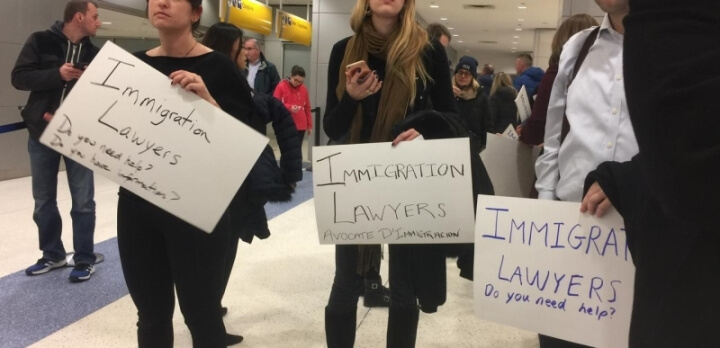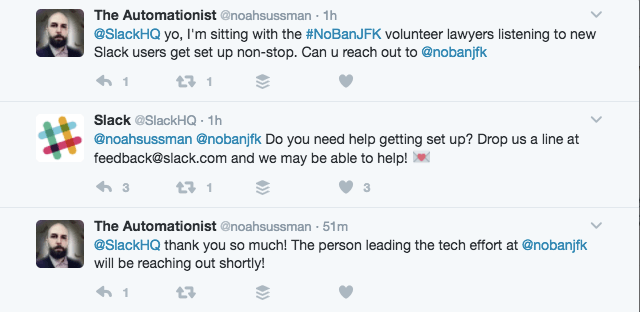President Trump’s recent executive order temporarily banning travel from seven Muslim-majority countries has caused a lot of confusion at airports across the U.S. It has kicked off a firestorm of criticism on social media and has led to protests at airports around the country.
One group of people that’s been working for those affected by the order is the lawyers.
This is the moment in our generation where you understand, ‘this is why I went to law school.’
Hundreds of lawyers have showed up at major airports across the U.S. to offer their services free of charge. Some started by holding up placards offering help:

Image credit: Mic.com
It hasn’t been easy: Lawyers have had trouble connecting with clients, or even getting information about whether their clients are being detained.
But translators, media experts, and other non-lawyers have also come out in droves to help. And for many lawyers, jumping in to help out wasn’t even a question.
“This is the moment in our generation where you understand, ‘this is why I went to law school,’” said Adam Cohen, an attorney and volunteer at John F. Kennedy Airport. “I think that this is actually a constitutional crisis. This is where we’re needed most.”
Adam said that one woman was in detention for over 26 hours before she was released. And there were many more stories like this. As of Tuesday, lawyers at JFK had assisted 71 people affected by the order from 20 different countries.
Getting the word out and organizing with technology
Lawyers have a reputation for being a bit hesitant with technology, but the mobilization of lawyers in response to Trump’s executive order looks to be proving that wrong.
Lawyers are using signup.com and Google Forms to coordinate volunteer shifts. They’re using Facebook and Twitter to help gather support. They’re using Google Sheets and Amazon Wishlists to communicate which supplies are needed. And they can use Clio’s cloud-based practice management solution for free to keep track of their on-the-ground case.
It might not seem like the best time to start using new software, but today’s solutions are so easy to use that it might be worth it. For example, lawyers at JFK signed up to Slack for communications:

Technology is also making it possible for people to help even if they are miles away from an airport. Sara Kubik lives in rural Michigan, but she’s been using technology to help all she can. Sara started the #helpthelawyers hashtag to help consolidate posts and get the word out about the effort. (You can keep up with what those involved are doing at @HelpTheLawyers or Help The Lawyers on Facebook.)
Who says lawyers don’t embrace tech? Since Sat, lawyers have used facebook, twitter, google docs, amazon registries, apps. #helpthelawyers
— Sara Kubik, PhD (@SaraKubik) February 1, 2017
A handwritten sign is helpful, no doubt. But, with the power of social media and technology, lawyers have gathered far more support and done far more than they would have been able to otherwise. Case in point: The American Civil Liberties Union (ACLU) gathered $24 million in donations in a single weekend.
How can you #helpthelawyers?
Want to help the lawyers? There are many ways you can get involved, but here are just a few to get you started:
- Tweet and retweet the #helpthelawyers hashtag
- Check out this post from Carolyn Elefant for further resources to support the effort
- Spread the word about Clio’s offer of free access to its software for lawyers volunteering
We published this blog post in February 2017. Last updated: .
Categorized in: Technology








